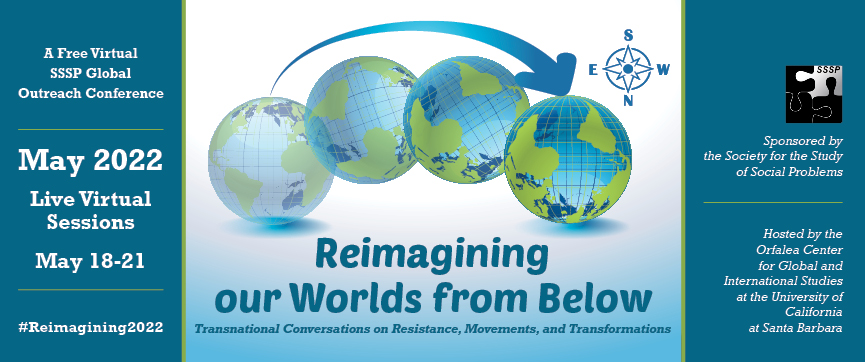Reimagining Our Worlds from Below: Panel 5

#Reimagining2022
***
From the Global to the Grassroots:
Fostering Transnational and Intersectoral Exchange in Participatory Practices and Methodologies
Participatory and community-based forms of social problem analysis are core elements of empowerment and change “from below” around the globe. For example, community development, participatory action research, and popular education entail particular methodologies for, and orientations towards, producing grounded knowledge and encouraging community building and social action. Such processes have proven effective in fighting social inequalities and finding useful and sustainable solutions towards social change. Yet, there is little transnational and intersectoral exchange on capacity building for research and the practical ways of doing participatory analysis across social movements, academic projects, organizing efforts and civic engagement.
This session invites activists, academics, unionists, community workers, members of non-government organizations and governmental entities alike to present their practices and experiences of participatory problems analysis and political action. In particular, contributions on “train the trainer” models for developing participatory methods and integrating them with community organizing strategies and social movement work are welcome. We hope not only to showcase hands-on knowledge about the particular use of participatory problems analysis in different contexts, but also contribute to networking and continued exchange.
Session organizers: Corey Dolgon, Stonehill College (MA, USA) & Eberhard Raithelhuber, Bertha von Suttner Private University (Austria)
Click on the presentation name to link to abstract and presenter bio.
Corey Dolgon, PhD, Stonehill College (USA)
“Diasporas as Actors in Urban Diplomacy: The Case of Mexico City´s Diaspora in Chicago“
Antonio Alejo, PhD, University of A Coruña (Spain)
Camila Macedo Ponte, University of Geneva (Switzerland) and Patrícia Ferreira de Souza Lima, PhD, Federal Center for Technological Education of Rio de Janeiro (Brazil)
“Creating a Commons in the 21st century: The Experience of an Urban Food Forest in California”
Elisa Privitera, University of Catania (Italy); Noa Cykman, University of California, Santa Barbara (USA); and Tony Barbero, University of California, Santa Barbara (USA)

Hi everyone! I am the 2021-22 Chair of SSSP’s Transnational Virtual Initiatives Committee, the group that organized this conference. I am excited that our conference is finally here and we have a chance to hear from people who care about social problems around the world.
I wish you a good conference. I hope you will join us in this forum, just introducing yourself and sharing your thoughts, insights, questions and your own work. Welcome!
Camila, thanks a lot for your very inspiring presentation on the “Network for Disaster Risk Reduction in Rio de Janeiro”. I appreciate first that you gave it in Brazilian with English subtitles, which worked perfectly for me. I have a number of questions, which we might be able to address in the live discussion. How can the role of those participants in the SER network who identify as “researchers” be understood in concrete terms? In one sequence of your talk, you speak about their activities, e.g. to promote educational actions in schools, provide research seminars, and build an accessible database for the development of research. In other words: how are these researchers part of the trustful relationships that characterize the networks with 140 members? How do they develop participatory research and capacity building activities?
Dear Noa, Lizzy and Tony, thanks for your presentation on this project in California, USA, that emerged under quite difficult pandemic circumstances. I loved the almost spacy camera work and Tony’s underlying voice while he shared his first-hand experience, all of that being framed by your (Noa and Lizzy) caring contextualization.
What I’d like to know more about is particularly the ways in which you as activist (gardening) researchers were able to link in with the project. It is clear to me that sharing experiences and working together enables “us” embedded, engaged academics to gain invaluably rich data, especially on the interaction of highly diverse actors, users, stakeholders etc. Yet, I’d like to know more about how the academic experience and methods that you have at your disposal helped bring about the project in a particular form, or—vice versa—how the approach you took can help recalibrate our own knowledge production and mission.
Dear Antonio, thanks for your contribution “Diasporas as Actors in Urban Diplomacy: The Case of Mexico City´s Diaspora in Chicago“. It gives me an insight into the development of an emerging urban diplomacy and change in urban foreign policy based on an understanding of the translocal relatedness of diaspora communities, based on the example of Mexico and Chicago. I think that what you refer to in a short sequence as a long transnational struggle of the Mexican diaspora in Chicago to be represented in their city of “origin”, which finally resulted in the institutionalized representation of translocal communities through a “migrant deputy” in the Congress of Mexico City is truly based on a development and struggles “from below”. Somehow, it can be seen as an institutionalized “participatory practice”, to take an expression from the title of this overall panel that I co-organized.
What I would like to know more about is the following: What is or can be the role of research and (academically based) problem analysis in all of this, particularly in your example? Do we as researchers literally and merely “take note” of those developments once they have already taken shape, thus always being “too late” in a way? Or how does research also contribute to the establishment of these translocal spaces and deterritorialized claims for (bi- or multi-local) belonging, including political and social entitlements to representation and security? Is there possibly even a need for academic engagement in order to bring about the stunning outcomes that you referred to in your talk? And if so, how do we as researchers engage in effective and salutary ways with those movements “from below”?